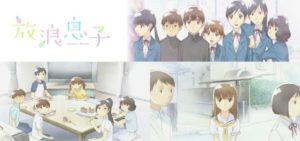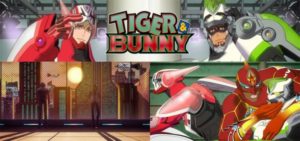[slideshow_deploy id=’25632′]
It bares repeating for those of you who don’t know:
– For rating, I will use psgels’ 100 score system, but keep in mind that my barometer might be different than his. For instance, I consider 60/100 (not 50) as a line between mediocre and passable shows. 75/100 to 89/100 are recommended shows and from 90/100 upward are the masterpieces. In some rare occasions, I will include plus (+) and minus (-) but remember that they don’t have anything to do with the quality of the shows. (+) is awarded for shows that address the gender role thoughtfully, including shows that have strong feminine message. (-) is casted for shows with insensitive treatment to gender roles.
– There will be mild spoilers, as I will address the main theme of each show.
Wandering Son (AIC)
Boy, I know I’d come to enjoy this series given its thoughtful subject matter, but I’d never expect the show gets under my skin the way it did. Wandering Son turns out to be even better than what I expected. Yes, they nail it on the struggles transgender youth must face during their puberty, but at heart this is a coming of age story about coming to term with their own identity. Crossdressing is a way for the kids to express who they truly are, the self that they feel most comfortable with. One thing that struck me the most is how simple the show seems to be, but it’s anything but. From the soft watercolor background, to the simple and plain character designs (those are in the service of the show, as the main leads have their asexual appearances), to the way the story focuses on slice-of-life drama, to the equally soothing soundtrack. Everything seems light-weight at first glance, but inside it, there are many complex relationships and even more complex narrative. The transgender aspect never becomes to preachy or heavy-handed, for once, and the show makes itself clear that it never judges any of these characters. It’s just simply a normal growing up tale from a boy and his friends, nothing more, nothing less.
I also appreciate the anime for the fact that it left out entirely the first section of the manga, so many drama and characters have already been introduced before we get to know them. Fear not, since everything we need to know about the characters and their dynamic are showed and hinted subtlety over the course of its run. For me, the best parts of the show aren’t the subject matter it deals with, but the rich cast and their complex dynamic together. Take the latter for example, many characters form a very special relationship to each other (many has complained the characters behave too mature for their age, which I digress. We need more of these). And it’s these special bonds that made every single one of them interesting. Take Chiba’s love for Shuu: doesn’t matter how he changes, he will always be the special person to her. The same can be said for Yuki and Takatsuki. It often feels like they reach to a mutual understanding that other people can’t never comprehend. And I suppose sharing the same deep bonds as these makes up the reason why they can always rely on each other, even overcome their own issues to reach out for each other.
Shuu and Takatsuki made up two strong protagonists for this show, both because they’re trans who bothered by their own biological bodies, but also their special bond as well. Noted that while Wandering Son deals heavily in transgender issues, all the romantic relationships in the anime are heterosexual – most notably, Shuu and Anna’s love. Why? Because, of course Shuu loves her. Not in a physical attraction sense since I guess Shuu would never desired to kiss her, but in the intimacy sense where he loves her and cares for her like a sibling love. Is it make their relationship weird? Maybe. But it’s powerful nonetheless. Although I already enjoy the first half of the anime well enough, where they focus on the kids and their gender-bender Romeo and Juliet play, the second half is when Wandering Son hits me real hard. Insecurity plays another major role to these kids, as they are constricted by social norms, by the code of rules that dictates how boy and girls should wear and behave. Takatsuki comes a long way until she decides to cross-dress as a boy to school, but Shuu has it much harder by trying the same thing. The escalated tension when Shuu gradually believes that he should dress up in girl’s uniform because he feels comfortable doing so is one of the moment so powerful that it won’t leave my head anytime soon. It’s one hell of a statement right there and it’s more compelling than any LGBT campaign because it comes from very personal lenses.
As a side note, despite people often complain the show for the lack of proper closure, for me it ends in the best possible way. In that final moment, Shuu literally takes a step forward to the stage. That single image can signify many things: that he’s taking anew step towards the spotlight with his new body; that he finally let the dark and bullied past behind; that he moves on to the next puberty stage of his life. Shuu and his friends continue to live on beyond the scope of this little story.
Rating: 92+/100
Tiger & Bunny (Sunrise)
It’s amusing to note that these two shows received the same rating 87.5 here in by psgels, my opinions on these two couldn’t be more varied. Let’s start from its best components first, Tiger & Bunny is the show that has novel concept, a commercial Superhero reality TV show in the neo-modern city that looks like a glamourous version of Gotham. It’s a pretty cool idea and moreover, the concept of commercial superheroes and their ability “NEXT” have potential to develop into heaps of interesting scenarios. It helps that the show makes these superheroes and their moves as flashy and over the top as possible. Another plus for the shameless corporate sponsorship’ logos that pop up in the team uniforms. Flashiness and cool factor have never been this appropriate. The art design is awesome, especially the city itself that feels lush, noisy but gritty at the same time. The production values, for the most part, fulfil their roles quite remarkably. The fights are dynamic, and those action sequences are always damn fun to follow to say the least. The CG department, however, is wacky and looks out of place whenever the two leads are in the combat suits. Take Tiger & Bunny as a purely action show, it certainly satisfies your cravings.
But Tiger and Bunny is more than a mindless action show. It consistently develops into overarching arcs with more serious tone, and that, my friend, is where the show becomes hit and miss. On positive notes, these arcs make Tiger and Bunny more ambitious than your normal Superhero show and the main leads do grow a bit in their character development. The titular Tiger and Bunny, in particular, share some solid chemistry together. The show, on the other hand, has the Western Superhero and Hollywood as their inspiration and it unfortunately inherits the stupidity of Hollywood’s script as well. There is little to no grey area, the heroes are mostly your hero of justice and the villains get more and more evil as the story progresses. I don’t mind about some casual plot holes or some character inconsistencies because… you know, ACTION show, but the last arc, in instance, is so ridiculous and laughable bad that I have to mark the show down several notes. In this last arc, the whole superhero team suddenly becomes puppets with no personality, or even worse, betray their own personality. Kotetsu is being hunted by the police and being broadcasted live, and suddenly, all these developments are set aside for some more plot twists that go nowhere, fighting with Barnaby for no good logical reason and some other bullshits about androids. And I can never get why the main antagonist thinks it’s such a great idea to brainwash dozen of superpowered and influential people, instead of just eliminating Kotetsu in silence.
Character-wise, I regret to say that although spending 25 episodes with them, at the end of the day I don’t know, or care much about them. Both Bunny and Tiger are your stereotyped JUSTICED superheroes, with Barnaby’s backstory is the one we all heard before (Batman, anyone?). Other heroes each have their own episode that flesh them out a bit, but still ain’t enough to make them stand out at all. Villains are over the top in a no-good way and Lunatic (an anti-hero of sort) has never developed into his full potential. Overall, Tiger & Bunny is an adequate take on the same old Superhero genre that make some good use of the old ideas, especially in their brilliant main concept. The mixture of buddy actions, hero of the week, drama make this show consistently entertaining to follow, despite more often than not they follow the same old formula that been around since the creation of Western Comic.
Rating: 78/100
Welp, turns out I finished these two faster than I originally planned. Have you watched either Wandering Son or Tiger & Bunny? What is your take on those shows? Next time, we will meet a girl who plays karuta and a girl who is a NEET detective. Yep, I will review Chihayafuru and Heaven’s Memo Pad. See you in 2 weeks or so (this time is for real). Until then.





































